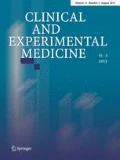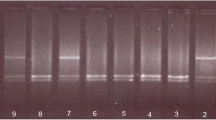Abstract
Apolipoprotein E is a fundamental component of various lipoproteins and plays substantial role in cholesterol/lipid transport among cells of various tissues. The ApoE gene is polymorphic with three alleles ε2, ε3, and ε4, coding for isoforms E2, E3, and E4 having different binding inclination for corresponding receptors. This work aimed to investigate the association between ApoE gene polymorphism and coronary artery disease (CAD) in Kashmiri population. APOE genotyping was done by polymerase chain reaction-restriction fragment length polymorphism. Our study indicated ApoE ε3/ε3 to be the most common genotype in both CAD and control group. The frequency of ε2, ε3, and ε4 alleles of ApoE gene in cases was observed to be 0.06, 0.72, and 0.20, while in control subjects it was 0.075, 0.82, and 0.11, respectively. A significant difference was found between cases and controls with respect to TC, LDL, and HDL levels. Our data showed that frequency of ε4/ε4, ε4/ε3 genotype and ε4 allele was significantly higher in cases than in controls (p = 0.02, p = 0.004, p < 0.001 respectively). Moreover, the CAD patients carrying ε4 allele had significantly higher TC and LDL levels (p value <0.01). Thus our data showed a significant association of ApoE ε4 allele with the risk of CAD. The data revealed that ApoE ε4 allele is associated with increased risk of CAD and increased levels LDL and TC in Kashmiri population.
Similar content being viewed by others
References
World Health Organization. The World Health Report 2007: global public health security in the 21st century, 2007.
Joshi P, Islam S, Pais P, et al. Risk factors for early myocardial infarction in South Asians compared with individuals in other countries. J Am Med Assoc. 2007;297(3):286–94.
Mahley RW. Apo lipoprotein E: cholesterol transport protein with expending role in cell. Science. 1988;240:622–30.
Winkelmann BR, Hager J. Genetic variation in coronary heart disease and myocardial infarction: methodological overview and clinical evidence. Pharmacogenomics. 2000;1:73–94.
Dimitrios N, Tziakas MD, Georgios K, Chalikias MD, Christos O, Antonoglou MD, Stavroula V, Ioannis KT, Alexandros XK, Dimitrios IH, Juan CK. Apolipoprotein E genotype and circulating interleukin-10 levels in patients with stable and unstable coronary artery disease. J Am Coll Cardiol. 2006;48(12):2471–81.
Rall SC Jr, Mahley RW. The role of apolipoprotein E genetic variants in lipoprotein disorders. J Intern Med. 1992;231:653–9.
Kuusisto J, Mykkänen L, Kervinen K, Kesäniemi YA, Laakso M. Apolipoprotein E4 phenotype is not an important risk factor for coronary heart disease or stroke in elderly subjects. Arterioscler Thromb Vasc Biol. 1995;15:1280–6.
Heish WJ, Sing-Ka L, Ming-Shien W, Tseun KJ. Characterisation of apolipoprotein E genetic variations in Taiwanese: association with coronary heart disease and plasma lipid levels. Hum Biol. 2002;5:1–3.
Davignon J, Gregg RE, Sing CF. Apolipoprotein E polymorphism and atherosclerosis. Arteriosclerosis. 1988;8:1–21.
Stokic E, Dan I, Plecas A, Dan M, Obreht D. Distribution of e4 allele of apoE gene in patients with metabolic syndrome, obesity and CHD. In: Book of abstracts of 2nd symposium on hyperlipoproteinemia, 98. Serbian Medical Society, Medical Society of Vojvodina, 2008.
Koch W, Mehilli J, Pfeufer A, Schömig A, Kastrati A. Apolipoprotein E gene polymorphisms and thrombosis and restenosis after coronary artery stenting. J Lipid Res. 2004;45:2221–6.
Abu Marzzouk LF, Sharif FA, Abed AA. Relationship between ApoE gene polymorphism and coronary heart disease in Gaza strip. J Cardiovasc Dis Res. 2012;2:29–35.
Eichner JE, Dunn ST, Perveen G, Thompson DM, Stewart KE, Stroehla BC. Apolipoprotein E polymorphism and cardiovascular disease: a HuGE review. Am J Epidemiol. 2002;155:487–95.
Djan I, Stokic E, Sakac D, Djan M, Obreht D, Erak M, Jovanoic N. Case–control study of apoE gene polymorphisms in young CHD patients and controls in the Serbian population. Arch Boil Sci Belgrade. 2011;63:89–98.
Yousuf Adfar, Khursheed Nayil, Rasool Ishrat, Kundal Vijay, Jeelani Humira, Afroze Dil. Genetic variation of ApoE gene in ethnic Kashmiri population and its association with outcome after Traumatic brain injury. J Mol Neurosci. 2015. doi:10.1007/s12031-015-0554-1.
Breslow JC. Apolypoprotein genetic variation and human disease. Physiol Rev. 1988;68:85–98.
Rossouw JE. Hormones, genetic factors, and gender differences in cardiovascular disease. Cardiovasc Res. 2002;53:550–7.
Tikkanen M, Huttunen J, Ehnholm C, et al. Apolipoprotein E4 homozygosity predisposes to serum cholesterol elevation during high fat diet. Arteirosclerosis. 1990;10:285–8.
Ilveskoski E, Loimaala A, Mercuri MF, et al. Apolipoprotein E polymorphism and carotid artery intima-media thickness in a random sample of middle-aged men. Atherosclerosis. 2000;153:147–53.
Howard BV, Gidding SS, Liu K. Association of apolipoprotein E phenotype with plasma lipoproteins in African-American and white young adults. The CARDIA study. Coronary Artery Risk Development in young adults. Am J Epidemiol. 1998;148:859–68.
Corbo RM, Scacchi R. Apolipoprotein E (APOE) allele distribution in the world. Is APOE*4 a ‘thrifty’ allele? Ann Hum Genet. 1999;63:301–10.
Wilson PW, Schaefer EJ, Larson MG, Ordovas JM. Apolipoprotein E alleles and risk of coronary disease. A meta-analysis. Arterioscler Thromb Vasc Biol. 1996;16:1250–5.
Acknowledgments
We gratefully acknowledge all the CAD patients and healthy blood donors who have participated in this study.
Author information
Authors and Affiliations
Corresponding author
Ethics declarations
Conflict of interest
None.
Additional information
Dil Afroze and Adfar Yousuf have equally contributed to this work.
Rights and permissions
About this article
Cite this article
Afroze, D., Yousuf, A., Tramboo, N. et al. ApoE gene polymorphism and its relationship with coronary artery disease in ethnic Kashmiri population. Clin Exp Med 16, 551–556 (2016). https://doi.org/10.1007/s10238-015-0389-7
Received:
Accepted:
Published:
Issue Date:
DOI: https://doi.org/10.1007/s10238-015-0389-7




